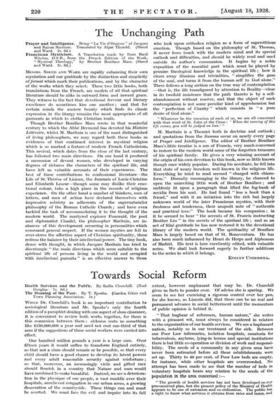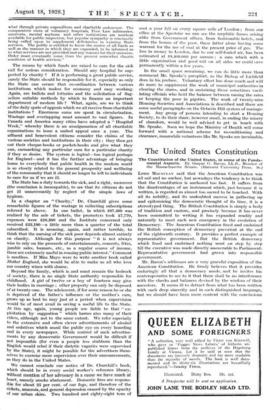Towards Social Reform
The Housing of the Poor. By T. Speak°. (Carden Cities and Town Planning Association. Is.)
WHILE Dr. Churchill's book is an important contribution to sociological literature and Mr. Speake's only the fourth
edition of a pamphlet dealing with one aspect of slum clearance,
It is convenient to review both works together, for there is this connexion between them: sickness costs us something
like £150,000,000 a year and need not cost one-third of that Sum if the suggestions of these social workers were carried into effect
One hundred million pounds a year is a large sum. Over fifteen years it would suffice to transform England entirely, so that not a slum should remain or be possible, so that every
child should have a good chance to develop its latent powers and every adult reasonable security against misfortune ;
so that, moreover, an increasingly virile and gifted race should flourish in a country that Nature and man would have combined to make beautiful. Instead, we see a deteriora.
tion in the physique of our people, a vast muddle over their hospitals, unrelieved congestion in our urban areas, a growing desecration of the countryside. These things can and must he averted. We must face the evil and inquire into its full extent, however unpleasant that may be. Dr. Churchill gives us facts to ponder over. Of advice she is sparing. We seem to see her exercising a rigorous control over her pen, for she knows, as Lincoln did, that there can be no real and permanent advance in social betterment until the momentum of public opinion is behind it.
"That bugbear of reformers, human nature," she writes with a pleasant wit, must always be considered in relation to the organization of our health services. We are a haphazard nation, notably so in our treatment of the sick. Between our Poor Law infirmaries, isolation hospitals, sanatoria for tuberculosis, asylums, lying-in homes and special institutions there is but little co-operation or division of work and responsi- bility. The needs of a community in any given area have never been estimated before all these establishments were set up. Thirty to 40 per cent. of Poor Law beds are empty, for instance, while other hospitals are overcrowded. No attempt has been made to see that the number of beds in voluntary hospitals bears any relation to the needs of the population in the area concerned :— " The growth of health services has not been developed on any preconceived plan, but the present policy of the Ministry of Health appears to be one of extension and co-ordination. The public has a right to know what services it obtains from rates and taxes, and
what through private expenditure and charitable endeavour. The comparative costs of voluntary hospitals, Poor Law infirmaries, sanatoria, mental asylums and other institutions are nowhere available for public inspection, but popular sympathy is constantly being called upon to supplement deficiencies in existing State services. The public is entitled to know the source of all funds as well as the manner in which they are expended, to be informed as to what services are not provided and any reasons for their omission. Order must eventually come Nom the present somewhat chaotic condition of health services."
The means by which funds are raised to care for the sick call for serious consideration. Should any hospital be sup- ported by charity ? If it is performing a great public service, surely the State should be responsible for it, especially as only the State can secure that co-ordination between various institutions which makes for economy and easy working. Again, are ballots and lotteries and the solicitation of flag- sellers suitable methods by which to finance an important department of modern life ? What, again, are we to think of the daily spate of appeals which we all receive from charitable institutions ? Enormous sums are spent in circularization. Wastage and overlapping must amount to vast figures. In Canada and America many cities have adopted a "Hospital Week," whereby there is an amalgamation of all charitable organizations to issue a united appeal once a year. The affluent and benevolent citizens consider the claims of the various societies and institutions in their city ; they then get out their cheque-books or pocket-books and give what they can, earmarking any particular sum for a particular charity if they so desire. The system is logical—too logical perhaps for England—and it has the further advantage of bringing home to everybody that public health in the modern world is so closely related to the general prosperity and wellbeing of the community that it should no longer be left to individuals to care for us if we are ill.
The State has a duty towards the sick, and a right, moreover (the conclusion is inescapable), to see that its citizens do not get ill unnecessarily by neglect of the simple laws of hygiene.
In a chapter on "Charity," Dr. Churchill gives some remarkable figures of the wastage in collecting subscriptions referred to above. In one ballot, in which £87,460 was realized by the sale of tickets, the promoters took /7,7'70, expenses were /56,500 and the Institute concerned only received £23,190—a little more than a quarter of the total subscribed. It is amazing, again, and rather terrible, to think that the nursing of the sick poor depends almost entirely on charity. Although for this purpose "it is not always wise to rely on the proceeds of entertainments, concerts, fetes, jumble sales, bazaars, etc., as a regular source of income, these are extremely useful in rousing public interest." Comment
is needless. If Miss Mayo were to write another book called Mother England, she would be able to make us all who love
our country wince with shame.
Beyond the family, which is. and must remain the bedrock of society, there is no single State authority responsible for childhood. A girl of twelve or a boy of fourteen may give their bodies in marriage ; other property can only be disposed of at twenty-one. The adolescent, if for some reason he or she is deprived of the father's influence or the mother's care, grows up as best he may just at a period when supervision would be of most avail in saving a useful life to the State.
At this age, again, young people are liable to that "ex- ploitation by suggestion" which harms also many of their elders, although not to the same extent. We refer especially to the extensive and often clever advertisements of alcohol and sedatives which assail the public eye on every hoarding and in every newspaper. While control of such advertise- ments by any democratic Government would be difficult if not impossible (for even a people less stubborn than the English would rebel if their dietetic vagaries were supervised by the State), it might be possible for the advertisers them-
selves to exercise more supervision over their announcements, as they do in the United States.
We cannot conclude our notice of Dr. Churchill's book, which should be in every social worker's reference library,
Without mention of her advocacy in a cause we have much at heart, namely smoke abatement. Domestic fires are respons- ible for about 25 per cent of our fogs, and therefore of the rickets, anaemia, and general depression caused by the opacity of our urban skies. Two hundred and eighty-eight tons of soot a year fall on every square mile of London ; from our office at the Spectator we can see the mephitic fumes arising alike from Government offices, from fashionable hotels, and from the homes of the poor, these latter alone having some warrant for the use of coal at the present price of gas. The loss in money to London, due to our self-fouled air, has been estimated at £8,400,000 per annum ; a suns which with a little organization and good will on all sides we could save permanently within a few years.
In the small space remaining, we can do little more than commend Mr. Speake's pamphlet, as the Bishop of Lichfield does in his preface. Voluntary effort has done much and will do more to supplement the work of municipal authorities in clearing the slums, and in sustaining those sometimes vacil- lating officials who hold the balance between raising the rates or keeping the poor in pigsties. The work of twenty-nine Housing Societies and Associations is described and there are some useful paragraphs on the Octavio Hill system of manage- ment. Any group of persons intending to start a Housing Society, to do their share, however small, in ending the misery of slumdom, would be well advised to get in touch with Mr. Speake. Soon we hope the Ministry of Health will come forward with a national scheme for reconditioning and clearance, meanwhile volunteers like Mr. Speake are invaluable.

































 Previous page
Previous page